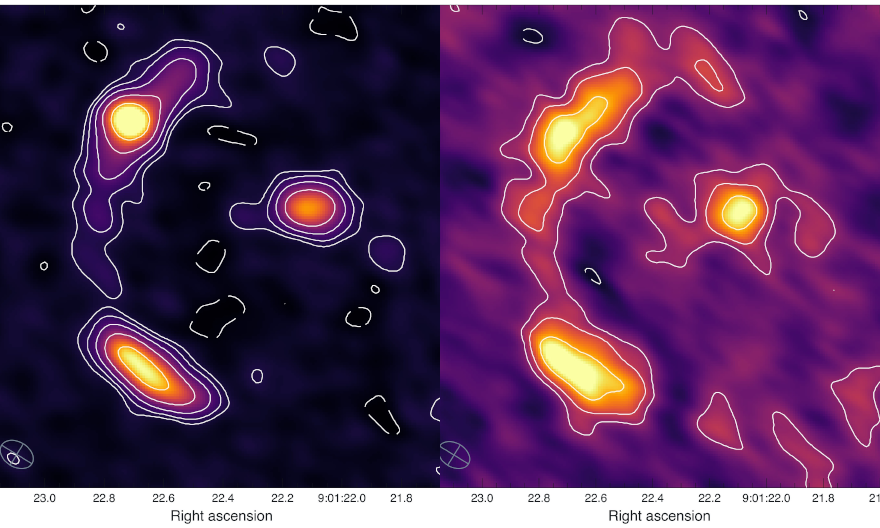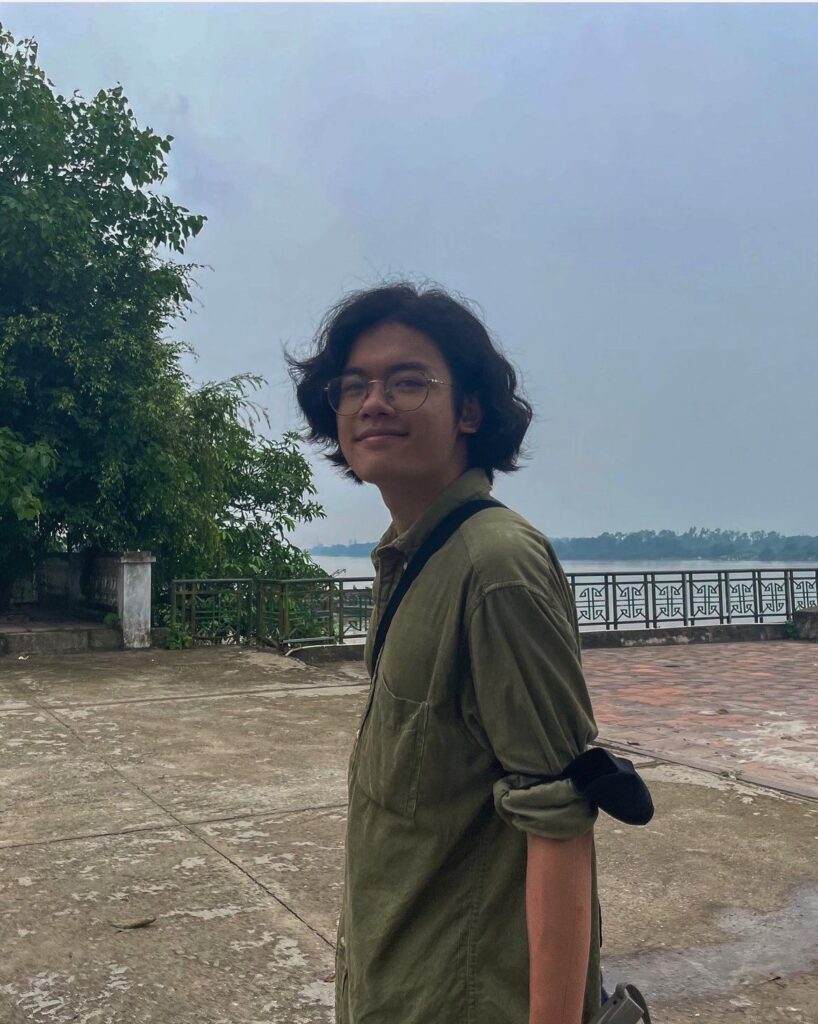Class of 2024 deepen academic interests through capstone projects
From a philosophical take on Hello Kitty to unravelling mysteries of early galaxies and exploring migration and identity
For many students at Yale-NUS College, the completion of a capstone project is a pivotal moment in their undergraduate experience, serving as a culmination of skills and interests accumulated over the years. This year-long, self-directed project takes place in their final year and involves original research related to the student’s area of interest. In this article, we will delve into senior capstone projects, looking at a philosophical exploration of Hello Kitty, research on early galaxies, and the experiences of Vietnamese scholars in Singapore.
Chloe Ang: Exploring the Philosophy of Hello Kitty
 Chloe Ang during their fieldwork in Taiwan. Image provided by Chloe Ang.
Chloe Ang during their fieldwork in Taiwan. Image provided by Chloe Ang.
Chloe Ang, a Philosophy major, embarked on a playful yet thought-provoking journey with their capstone project titled ‘Is Hello Kitty the Übermensch? The Limits of Philosophy and Mankind’. Chloe’s project brought together their love for philosophy and for Hello Kitty as well as insights from disciplines outside of philosophy, such as from a History class with Associate Professor of Humanities (History) Taran Kang.
When asked to describe their capstone in one word, Chloe said “playful”. In this capstone, they attempt to “make philosophy fun again” by arguing that Hello Kitty is Friedrich Nietzsche’s Übermensch. Chloe argues that philosophy should return to a state of play rather than remain in its current structured state. Play has the strong potential to address modern philosophy’s many shortcomings by making the field more accessible to those beyond the academic domain. To demonstrate how play can be incorporated into philosophy, Chloe coined the term “Playlosophy” inspired by what Chloe describes as “the most renowned playful philosopher”, Zhuangzi, who is an influential Chinese philosopher from around the 4th century BCE. Finally, in their own “Playlosophy” attempt, they show the similarities between a very playful character, Hello Kitty, and Nietzsche’s concept of the Übermensch.
To explain this concept, Chloe referred to a quote from Nietzsche’s Thus Spoke Zarathustra:
“What is ape to man? A laughingstock or painful embarrassment. And man shall be that to overman (Übermensch): a laughingstock or painful embarrassment.”
“This can be thought of in an evolutionary sense, where the Übermensch is a post-human being. In my capstone, I identify characteristics such as: 1) the Übermensch is rooted in this world; 2) the Übermensch transcends and creates new values: and 3) the Übermensch differentiates themselves from others,” explained Chloe. These were traits that they thought Hello Kitty shared.
Appreciating the freedom that came with deciding by themselves the readings that would be most helpful or interesting, Chloe was grateful for how self-paced and dynamic the capstone journey was, allowing them to be driven by what excited them most. The highlight of Chloe’s journey was their research trip to Taiwan, where they immersed themselves in the local Hello Kitty culture, gaining valuable insights for their project. “Taiwan is obsessed with Hello Kitty!” said Chloe, when explaining her decision to conduct fieldwork there rather than in Japan, Hello Kitty’s birthplace. Hello Kitty was commonly seen in Taiwan, from train stations to convenience stores to Taiwanese airlines. This trip enabled Chloe to better understand the nature of Hello Kitty and thereby further their argument. “Hello Kitty, embodies play herself through the many forms and mediums she assumes. For instance, Hello Kitty is canonically nine years old but ran for American president at some point!” said Chloe.
All in all, the argument of Hello Kitty as the Übermensch is in service of a larger argument that philosophy should be playful. It is a return to the past of sorts as philosophy was deeply rooted in play at its inception. “For instance, Brahmins during the Vedic period in India engaged in riddle-games to test and arrive at knowledge regarding the origins of the universe. Having philosophy be playful can help immensely with its accessibility!” Chloe said.
Mira Dewan: Unraveling Mysteries of Early Galaxies
 Graph based on an algorithm measuring star formation. Image provided by Mira Dewan.
Graph based on an algorithm measuring star formation. Image provided by Mira Dewan.
Meanwhile Mira Dewan, a Physical Sciences major, looked even farther than Taiwan for her capstone project, embarking on a challenging interdisciplinary journey with her capstone project on early galaxies.
Her project, titled ‘Testing Measurements of the Star Formation Law in the Early Universe,’ aimed to improve existing methods for studying the star formation law (known as the Schmidt-Kennicutt Relation) in the early universe. When asked to explain her capstone, Mira lightheartedly responded that it involved “fitting a line (y=mx+b) using the most complicated methods known to humankind”. With a focus on the validation and comparison of two lines of best fit, Mira’s ambitious endeavor required her to hone her coding skills and gain confidence in the domain of computational analysis.
Driven by her passion for astronomy and guided by Assistant Professor of Science (Physics) Chelsea Sharon, Mira embraced the opportunity to delve deep into the complexities of the cosmos. Drawing on her experiences in previous classes, including Introduction to Black Holes, General Physics, and Modern Astrophysics, Mira navigated the theoretical intricacies of her capstone project with determination and curiosity.
Reflecting on her experience, she shared, “I really just wanted to push myself to learn a lot from this capstone, and that is definitely a goal I achieved!” She added that the challenging times were made easier through the support of her friends, fellow members of the Yale-NUS astronomy research group, and other Physical Sciences cohort members. She often reminded herself of a quote from Asst Prof Sharon: “Physics is a team sport!”
Billy Tran: Navigating the Scholarship Paradox
 Image provided by Billy Tran.
Image provided by Billy Tran.
Billy Tran, a Global Affairs major, took on a deeply personal exploration of migration and identity with his capstone project titled ‘The Scholarship Paradox: Desire and Discipline of Young Migrant Vietnamese Scholarship Students in Singapore.’
Billy’s research shed light on the complexities faced by young Vietnamese migrants pursuing educational opportunities in Singapore. He found that young migrants on scholarships are in a paradox; they are both desired by the state as skilled talent yet simultaneously ‘othered’ or excluded from truly integrating into Singapore through numerous societal and structural barriers. He then provided implications for Singapore’s foreign talent policy to ensure the well-being and retention of migrant students.
Billy shared that his capstone was sparked by a combination of both personal and academic interests.
“As a migrant in Singapore myself, I was motivated to conduct research on other Vietnamese migrants. It was a privilege being able to use my positionality [location in relation to various social identities such as race, class, nationality] in order to conduct interviews,” said Billy.
Drawing on his interdisciplinary background in Global Affairs and Anthropology and his personal insights as a migrant, Billy’s capstone project offers a compelling contribution to the discourse on migration, education, and social inclusion in Singapore. Through in-depth interviews and rigorous analysis, he sought to disrupt narratives of migrant scholarship students as “ungrateful” or “unwilling to integrate” that are sometimes seen in Singapore. By focusing on the stories and experiences of young migrant Vietnamese scholarship students, he hopes to foster empathy, understanding, and meaningful change in both policy and practice.
As all these students’ research demonstrate, capstone projects are often inspired by students’ experiences leading up to their final years, serving as the perfect opportunity to bring together the manifold skills and interests they have accumulated over the years.





